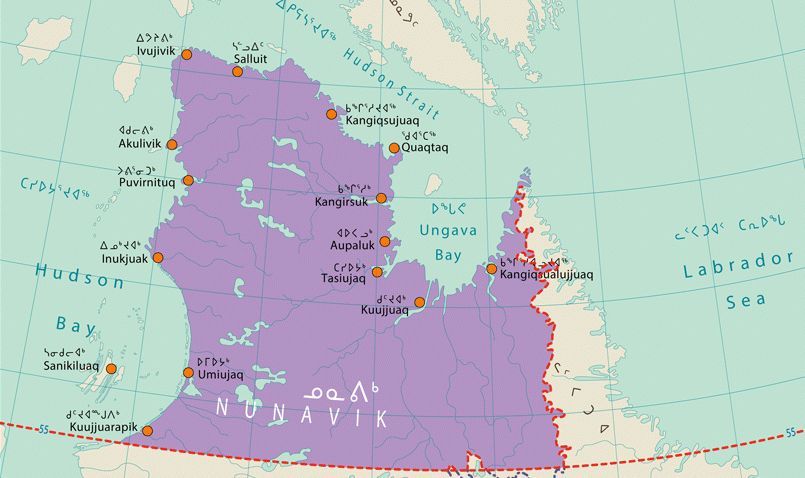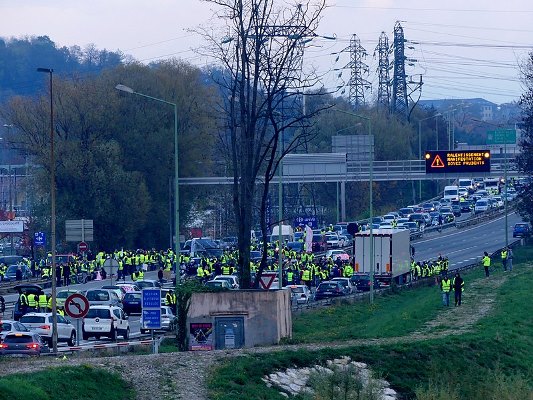Alexandra L is a member of Alternative Socialiste (ISA in Quebec).
Nunavik, which comprises the northern third of Quebec, had 16 cases of COVID-19 by the end of April, of which 13 people have now recovered. Most of the cases, 14, were in the town of Puvirnituq.
The northern communities have been concerned since the start of the COVID-19 pandemic; the Kativik Regional Administration responded by establishing protective measures for the Nunavik population. These measures range from personal confinement and curfews to exceptional security measures in airports. Flying is an essential travel service for isolated regions such as these. The Régie régionale de la santé et des services sociaux du Nunavik (Regional social services and healthcare board of Nunavik) is providing health care for the 14 nordic communities of Kativik.
Closing airports is impossible
As one would expect, closing down airports in Nunavik is impossible. Medical evacuations as well as the delivery of most general supplies is by airplane. It is sometimes the only mode of transportation between one community and the next. To limit the spread of the virus, it is now forbidden for passengers to leave the airplane until their final destination.
Insufficient health care services
Despite the relentless work of health care workers, the availability of services does not come close to matching the need. The current crisis is a testament to that fact. Nunavik only has health centres, so that critical cases have to be transported to Montréal via airplane. The two health centres are situated in Kuujjuaq and in Puvirnituq, providing limited services. Each centre services seven communities that often can only be reached by plane. The Ullivik health centre, situated in Montréal, offers care and services that cannot be offered in the two northern Nunavik centers (chemotherapy, specialized surgery, and the likes).
A pervasive shortage of living spaces
In 1986, the population of Nunavik reached close to 6,000 people. Now, it has doubled to nearly 13,000 inhabitants. Compared to the whole of Québec, the population is younger. In 2013, there was already a shortage of 900 social housing units. Only 15% of the population live in private homes. These homes are sometimes provided by the employer or are part of the 100 private properties of Nunavik.
The communities’ isolation is the main reason why there are so few available units. Boats and airplanes are the only means of transport to reach this territory. Both are affected by weather and the seasons, with airplanes unable to take off or land during heavy snowstorms, while the ships cannot navigate for several months due to ice. Building materials need to be transported by boat, which can only happen when the ice levels allow it. The northern communities are supplied by only two ships per year.
This lack of housing leads to difficulties in allowing the population to self-isolate through this COVID-19 crisis. In contrast to big cities, northern villages do not have enough hotel rooms to accommodate the population if the need for isolation became urgent. Families survive by offering others shelter while they await the construction of future housing. When children leave the home, people tend to look for smaller apartments, to leave more space for families.
However, the distances are nothing but an excuse. Capitalists are completely capable of sending personnel and resources when they decide to build a mine or find a lost expedition.
Severe policies, just not for mining companies
The material conditions of Nunavik explain, at least in part, why the local authorities are using a blunt approach to deal with the pandemic: curfew, confinement, working from home or being unable to leave an airplane until your final destination. But these measures were relaxed for the Raglan mine.
On April 13, the Coalition Avenir Québec (CAQ) government announced that the mines would be able to reopen on April 15. The mining companies had apparently demonstrated their ability to run their activities while also protecting their workers. The Regional Kativik Administration as well as the health care services of the region both expressed their concern in writing. . For the mines to reopen, certain restrictions had to be lifted, specifically concerning transport. The lifting of restrictions only concern those who come from the south, while the Nunavimmiut must remain confined. In other words, Inuit miners cannot go back to work alongside their southern counterparts.
The local population’s risk of infection must not be minimized by letting southern workers go back to Nunavik. An anonymous worker has come forward to describe how the mine was able to quickly buy medical tests to figure out if someone was infected or not. If they are infected, they are sent back south; if not, they are allowed to stay and work while respecting the preventative policies in place.
Which solutions?
Much like everywhere else, the short-term solution is for Nunavik to administer mass testing to immediately determine who is, or is not, infected with the virus. It is the only solution that can stop the propagation of the virus. Anyone coming from the south must be quarantined in a comfortable and secure environment. Protection and other health care equipment must be delivered to all 14 northern communities. Provincial and federal governments must ensure that the population has sufficient and affordable access to essential goods. The number of hospital beds and equipment must be raised to meet the potential number of people who may have need for them.
In the long term, we must build enough housing to serve the entire population adequately. In 2020, it is unacceptable that multiple families are forced to cram into a single home. Additionally, policies must be put in place to eliminate the widespread food insecurity in northern territories. There already are cooperatives; they must remain under the control of the Nunavimmiut workers. The provincial government must prioritize support of these means of distribution over large for-profit corporations.
No license to exploit the land must be given without having received the consent of the communities that will suffer the consequences of the extraction process. When licenses are given, the administration of the mines must be done with and by the local communities. The revenues must come back to these communities.
The gradual easing of confinement measures will begin throughout Québec and Nunavik. François Legault and the CAQ are incapable of organizing a safe process to go back to work. The only way to achieve a safe return to work is for workers everywhere to take corporations under democratic control and plan the economy with our needs in mind, not the profits of the rich. We must democratically manage our work schedules, security measures and work modalities at our jobs. It is the same for Nunavik. The Kativik Regional Administration and its health services have already taken steps in the right direction by limiting, as much as possible, the activities in the Raglan mines to protect Nunavimmiut inhabitants. We must go one step further for workers to be able to control their own natural resources, their health care, and their social services in the interest of their communities.
Alternative Socialist supports the creation of quality, public services that are accessible for all. We support the creation of affordable, safe, comfortable, energy neutral, and democratically-controlled housing for northern peoples everywhere.



